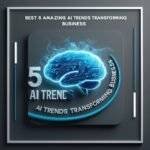Overview
Artificial intelligence is changing the whole dynamics of employment with benefits and challenges. Though it has replaced routine jobs, it also increases the demand for some specialized skills, such as data analysis and machine learning. The World Economic Forum said that by 2025, AI would generate 97 million new jobs worldwide. There is no qualm about the significance of jobs in AI in the future. Companies will need AI to function efficiently and innovatively.
Creativity, critical thinking, and emotional intelligence would be immune to automation. Upskilling and lifelong learning are thus imperative for better performance by workers in an AI-driven economy. Sowing seeds in AI job areas today means one has them ready for a varying workforce tomorrow.
Top AI Job Categories
1. AI Machine Learning Engineer
Machine learning engineers design algorithms that allow the system to learn from data and create models to work with big data in an efficient way.
Key Responsibilities:
• Develop machine learning models for specific applications.
• Optimize algorithm development for better performance and accuracy.
• Data scientist collaboration with improvement in input data
2. Data Scientist
A data scientist uses statistical techniques that help draw insights from complex datasets and allow organizations to produce informed, effective data-driven decisions.
Key Responsibilities:
• Cleaning and pre-processing data for analysis.
• Use machine learning algorithms to derive insights
• Create visualizations for your insights
3. AI Researcher
An AI researcher leads innovation in the field of artificial intelligence as a result of new research. They find new algorithms and contribute to the body of academic writing.
Key Accountabilities:
• Lead experimentation on new methodologies in AI
• Analyze outcomes and publish
• Collaboration with inter-disciplinary teams on projects.
4. Natural Language Processing Specialist
NLP experts build systems that understand human language very well. They are working on the applications that include chatbots and translation software.
Key Responsibilities:
• Develop algorithms for tasks involved in processing language.
• Train models on big text datasets
• Assess system performance based on improvement
5. Computer Vision Engineer
Computer vision engineers are building systems that precisely understand visual information. They are working on object detection and facial acknowledgment applications.
Main Responsibilities:
• Develop algorithms for tasks involved in image processing
• Train models using labeled image datasets.
• Test and prototype to infuse in real-world applications.

Job Roles and Descriptions
Technical Skills
1. AI Programming Languages
Programming languages are required for AI roles. The popular programming languages used for AI development are Python, Java, and C++.
2. AI Frameworks
AI frameworks such as TensorFlow and PyTorch need to be known for developing the machine learning models, which significantly ease the creation and distribution of the model.
3. Data Analysis and Visualization Tools
Data analysis and visualization tools will help professionals interpret complex datasets. The most widely used tool is Pandas, Matplotlib, and Tableau, among others.
Soft Skills
1. Problem-solving
Today’s challenge with AI engineers is problem-solving as it makes it easier to solve tricky problems. They should understand issues and find the best solutions speedily.
2. Communication
Effective communication skills are meant to explain technical concepts to those on the other side who are not positioned technically. Good communication helps build collaborations across various teams.
3. Collaboration
AI projects involve people who work from interdisciplinary teams. Good teamwork, therefore, constitutes a huge determinant of success and innovation in such projects.
Average Salary Ranges for AI Job Categories
Salary Ranges for AI Professionals
The mean salary for AI engineers in the United States stands at a rough estimate of $136,620 per year. An entry-level position will be around a yearly $118,166. Generally, those with 3-5 years of experience have wages about $147,880 per year. For senior AI engineers, the actual salaries often range between a mean of $163,037 and sometimes up to a yearly $200,000 or more.
Factors Influencing Salary
1. Location
Location is the primary factor affecting the salary scale for AI professionals. Some examples are mentioned below; AI engineers employed in San Francisco will make around $144,117 per year, whereas those in Mississippi could make approximately $102,818 annually.
2. Experience
Experience is an essential aspect of defining the pay scale. Entry-level jobs get paid less while professionals who have more experience receive much more high salaries. The senior level requires higher expertise and, therefore, gets paid more.
3. Industry
Other fields of profession through which industry affects an AI professional’s salary are as follows: Highest income are reported in Information Technology; the average annual Payment stood at $194,962. Media & Communication as well as Government & Public Administration are highly paid industries
4. Difference compared to previous data
Over the last year, demand for AI professionals has resulted in raising the salaries of many industries. Since the technology is advancing at an amazing speed, companies will do everything it takes to secure good AI engineers.
How to start with AI
1. Online Courses
Thousands of online courses are available on AI foundations. Learning and training via machine learning and data science courses are available in Coursera and edX.
2. Certifications
Having certifications helps boast about your skills in the market. For example, certifications are offered by Google, Microsoft, and IBM in AI and machine learning.
3. Resources for Free
To an extent, beginners can use some of these resources. Code.org and MIT provide introductory courses for both students and educators on AI concepts and their applications.

Practical Experience and Projects
Build Personal Projects
Reinforces memory. Start off with small projects, perhaps developing a simple chatbot or a small application that analyzes data.
Contribute to Open-Source
1. Practical Experience
Most of the open-source projects provide the user with practical hands-on experience. There are numerous AI-related projects out there; many can be found through resources such as GitHub.
2. Internships
Integrate yourself into real-life settings by doing internships. Try to get an internship with a tech company, where you will be able to test your skills and understand best practices from professionals.
Networking and Professional Development
1. Join AI Communities
Engagement in AI communities help you connect with like-minded people. Online forums, LinkedIn groups, and local meetups can offer great networking opportunities.
2. Attend Conferences
Attending AI conferences keeps you abreast of the current trends in the industry. NeurIPS and ICML include some of the industry’s foremost practitioners lecturing on the insights.
3. Continuous Learning
AI is a constantly evolving field that demands continuous learning. Join new research paper streams, online courses, and workshops regularly to get an update.
Conclusion
The AI job market grows with each passing day due to the rapid advancement of technology and increased demand from the employer group. By 2025, AI will create 97 million new jobs globally-while replacing 85 million others. Therefore, people should develop technical and soft skills, learn through online courses and other certification options, acquire practical experience through projects and internships, and network through AI communities and industry conferences.
AI jobs definitely have a bright future and require that one be flexible, ever-learning, and proactive about developing his or her skills. If flexibility is shown during this brave new world in which artificial intelligence is leading the way, then success in this line of work should be achieved.



